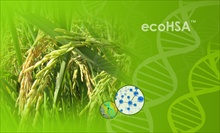Channels
Special Offers & Promotions
Animal-free Preparation of Human Serum Albumin
 AMSBIO has announced the launch of ecoHSATM - an animal-free preparation of the human albumin gene produced in the seeds of Asian Rice (Oryza sativa).
AMSBIO has announced the launch of ecoHSATM - an animal-free preparation of the human albumin gene produced in the seeds of Asian Rice (Oryza sativa).
Commercial human albumin proteins extracted from plasma have multiple and invaluable uses in cell culture work. However, existing and new regulations now discourage the use of animal components, even in early research studies. In additional human or animal derived albumin proteins, even those produced in vitro using insect or mammalian cultures, suffer from variable performance due to low yields and/or production complexities. Now the need for a defined, consistent and animal-free HSA is more important than ever.
Building on recent advances in seed protein production technologies to turn the rice endosperm into an optimal system for expressing recombinant proteins, ecoHSATM offers significant advantages over traditional albumins. ecoHSATM eliminates risk of animal or viral infectious agents in cell cultures and helps comply with FDA recommendations for animal-free components. Extensively tested in multiple functional studies, ecoHSATM has been proven to be similar in structure and biochemical function to native HSA in all tests performed. Furthermore rigorous standards and procedures in the manufacturing process of ecoHSATM ensure minimal batch-to-batch variability.
In tests - ecoHSATM has been shown to improve the health of cells by acting as a fatty acid carrier and hydrophobic moiety scavenger. In addition ecoHSATM extends the life of cell cultures by scavenging toxins as well as stabilizing membrane proteins and maintaining oncotic pressure thereby providing better cultures and results.
For further information on ecoHSATM Animal-free Human Serum Albumin please click here .
Founded in 1987, AMS Biotechnology (AMSBIO) is recognized as a leading international provider of unique & innovative products & custom services for life sciences research. The amsbio range includes over 23,000 polyclonal & monoclonal antibodies, peptides, recombinant proteins, extracellular matrix, molecular detection reagents, & tissue DNA, RNA, protein & microarray products. Key research areas include: apoptosis, cell invasion & migration, cell signaling, DNA damage, electrophoresis, glycobiology, posttranslational modification & stem cell biology.
Media Partners


